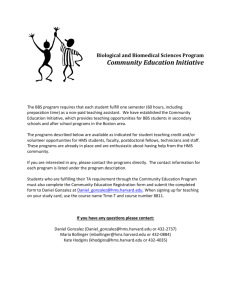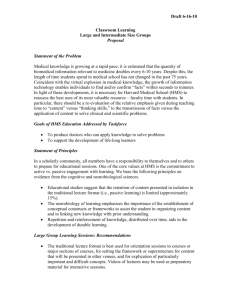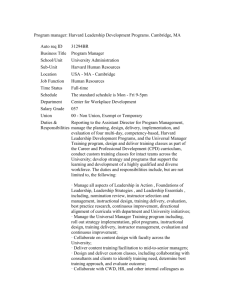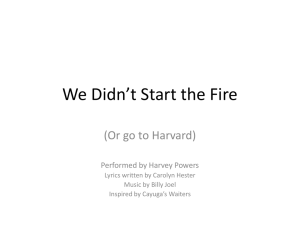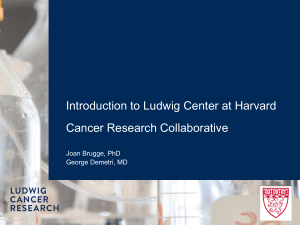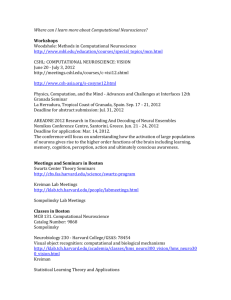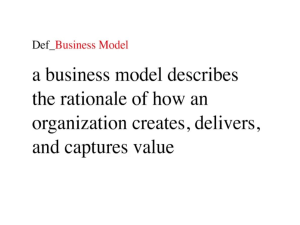Community Education Initiative
advertisement
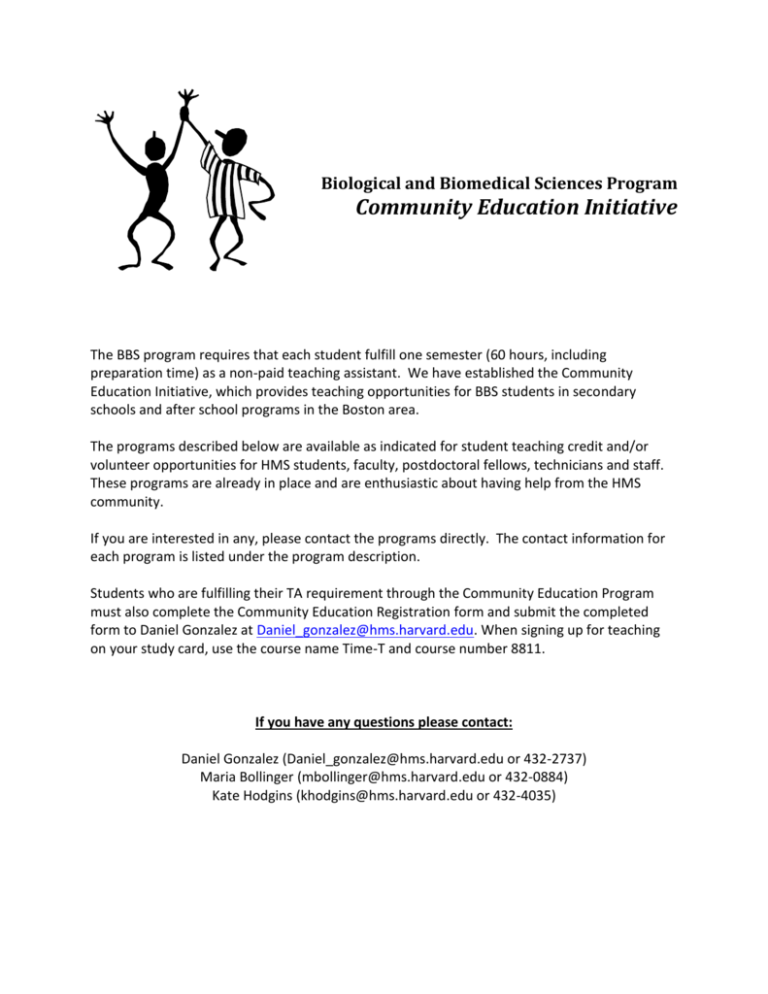
Biological and Biomedical Sciences Program Community Education Initiative The BBS program requires that each student fulfill one semester (60 hours, including preparation time) as a non-paid teaching assistant. We have established the Community Education Initiative, which provides teaching opportunities for BBS students in secondary schools and after school programs in the Boston area. The programs described below are available as indicated for student teaching credit and/or volunteer opportunities for HMS students, faculty, postdoctoral fellows, technicians and staff. These programs are already in place and are enthusiastic about having help from the HMS community. If you are interested in any, please contact the programs directly. The contact information for each program is listed under the program description. Students who are fulfilling their TA requirement through the Community Education Program must also complete the Community Education Registration form and submit the completed form to Daniel Gonzalez at Daniel_gonzalez@hms.harvard.edu. When signing up for teaching on your study card, use the course name Time-T and course number 8811. If you have any questions please contact: Daniel Gonzalez (Daniel_gonzalez@hms.harvard.edu or 432-2737) Maria Bollinger (mbollinger@hms.harvard.edu or 432-0884) Kate Hodgins (khodgins@hms.harvard.edu or 432-4035) AP Biology Hinton Scholars Program Hinton Scholars AP Biology Program is an after-school enrichment program that provides tutoring to Boston Public Schools (BPS) high school students, particularly underrepresented minority and/or low income students. The program is designed to enhance understanding of AP Biology concepts, provide laboratory exposure, and increase knowledge about careers in science. Tutors gain teaching experience by working with a cohort of approximately 8 students from a local Boston Public School (BPS) class who are studying AP Biology throughout the academic year. Materials are provided including the Campbell AP Biology textbook, student study guide and supplementary materials such as electronic slide presentations and animations. Tutors will also communicate and share curriculum resources through a course wiki. In addition to tutoring the students, tutors will accompany their students into the lab to help facilitate student integration of key biology concepts and principles into the student laboratory experience. Tutors will collaboratively work with AP Biology teachers and lab assistants to develop effective instructional strategies that support student understanding of scientific inquiry in an AP Biology laboratory. Sessions are held on Thursdays once a month from September 2013 – March 2014, 2:30 pm – 5:30 pm. Special events include a program Orientation September 26th and a Celebration Dinner in May. Tutoring sessions take place at the Harvard Medical School campus. There are six 3 hour sessions that include a 1 hour tutorial class and 2 hours embedded in the lab. The success of our tutoring model depends on tutors developing a positive mentoring relationship with a small student group throughout the program’s duration. The time commitment is estimated to be about 60 hours including preparation time. Biological and Biomedical Sciences (BBS) students may receive teaching assistant (TA) credit for serving as a tutor in the program. We ask that tutors make a commitment to attend all scheduled program activities and events for their assigned cohort. NOTE: This is an unpaid community outreach activity and there is no remuneration offered. Contact Information: Dr. Sheila Nutt, Director or Education Outreach Programs sheila_nutt@hms.harvard.edu 617-432-1557 Bob Rochlin, Program Coordinator rrochlin@comcast.net Basic Science Partnership The mission is to provide high school students and teachers with a resource for discovering the nature of the scientific process and understanding how basic research is conducted. In order to augment the curriculum at partner schools, we will work with teachers to design activities that integrate well into the classroom experience. Over the course of each semester, teaching assistants (TAs) will participate in weekly group tutorials for an advanced level group of students here at Harvard Medical School, in addition to several visits to the partner high school to establish hands-on activities for the introductory level curriculum. Over the course of the summer, graduate students can also work as TAs with a small group of summer interns who carry out projects in labs with the Cell Biology Department; this involves mentoring a weekly data/journal club and helping students prepare presentations of their projects and results. Preparation time per week will range from 1-3 hours; participation 1-2 hours. Contact Information: Davie Van Vactor davie@hms.harvard.edu 617-432-2195 HMS KIDS (Kindling Interest in Doing Science) Do you want a fun and rewarding way to fulfill your TA credit? Do you want to give back to the local community and inspire kids from Boston-area middle schools? If yes, then this is the perfect opportunity for you! HMS KIDS (Kindling Interest in Doing Science) is run in collaboration with the HMS Basic Science Partnership and the B-SAFE program of Boston to put on a fun, hands-on, two week science enrichment program and to inspire the next generation of scientists! This year we will be working at two sites, the Epiphany School at Dorchester and St. Stephen's Church in the South End, and we need volunteers! Volunteers will be involved in designing and running fun, handson science activities and demonstrations and helping the students work through them. The response from the kids, teachers, and volunteers from past years has always been excellent, so don't miss out on this opportunity to join in on the fun and inspire the scientists of the future! Our program this summer will run from July 15-26 in the mornings (9am-12pm) for the Epiphany camp and July 22-August 2 in the afternoons (1pm-4pm) for the St. Stephen's camp. Volunteers are responsible for lesson planning and teaching at only one of the two camps. If you are interested in being a part of this summer's program, please come to our information session on: Monday, April 22 at 6pm at TMEC, 447 Past volunteers will be there to tell you about their experience and to answer all of your questions. Dinner will be served! Please RSVP at hmskids@gmail.com by Thursday, April 18th if you will be joining us. Please also feel free to contact us if you are interested in the program but cannot attend! Contact Information: Amy Emerman (emerman@fas.harvard.edu) Kelli Carroll (carroll4@fas.harvard.edu) Crystal Rawlings (crawlings@fas.harvard.edu) Julie Donaghey (donaghey@fas.harvard.edu) Cambridge School Volunteers (CSV) CSV is a private, non-profit agency that recruits, trains, places, and supports volunteers in the Cambridge Public Schools, grades K-12. At the elementary level, volunteers serve as one-to-one tutors, classroom and library assistants, early math and literacy tutors, after-school homework helpers and more. At the Cambridge Rindge & Latin School (CRLS, the city’s public high school), volunteers provide one-to-one tutoring before, during and after-school, as well as classroom assistance, Science Olympiad advising, college planning and essay writing help, and more. For over 43 years, volunteers have helped thousands of Cambridge students with almost every subject. Tutors, especially in math and science, are always needed. Contact Information: Martha Osler, Director of Volunteer Recruitment (csv@cpsd.us) 617-349-6794, www.csvinc.org Continuing Umbrella of Research Experiences (CURE) Dana-Farber/Harvard Cancer Center Program Description The CURE (Continuing Umbrella of Research Experiences) program introduces high school and college students from underrepresented minority populations to the world of cancer research. Students obtain a hands-on experience in a cancer research environment. The primary goal of this program is three-fold: to identify, coach and nurture talented and highly motivated students for potential careers in biomedical cancer research; to increase and enhance students' skills in research practices, analytical thinking, presentations, and ethics; and to expose students to real time laboratory settings by hands-on involvement in ongoing research. Position Description We are seeking graduate level students who are willing to prepare and lead weekly journal club sessions during the CURE summer program (starting the week of 6/27 and finishing the week of 8/19). These sessions should increase scientific knowledge and expand scientific/research curiosity. The topics would include, but are not limited to, cancer research in basic, clinical, and population sciences. Responsibilities include: Choosing a scientific article to be assigned each week Leading your group’s discussion on the assigned article Providing feedback to the CURE program leaders on student participation Assisting students in creating a scientific presentation, including reviewing abstracts Practicing scientific presentations with the students For further information and to sign-up, please contact: Latisha Steele Latisha_steele@dfci.harvard.edu 617-632-3028 Health Professions Recruitment and Exposure Program (HPREP) Are you interested in teaching high-school students about science in a fun and interactive way or helping plan a high-impact program for adolescents? Then join the Health Professions Recruitment and Exposure Program (HPREP). HPREP is a HMS sponsored high school enrichment program organized by graduate students to recruit high schools students from underprivileged backgrounds into careers in science and medicine. Check out our photo highlights online at http://sites.google.com/hmshprep. Students participate in seven half-day Saturday sessions from November to February. Sessions include: interactive disease-based lectures, a research project, college mentoring, and ethics discussions. How can YOU help? Give a lecture, mentor a student, plan curriculum, and more! We are specifically looking for PhD students passionate about science outreach to help teach a session. There are many roles to fill, some with very little time commitment. All sessions are based in TMEC, so no travel required! IF YOU'RE INTERESTED IN LEARNING MORE ABOUT THIS STUDENT RUN PROGRAM: Contact HPREP@hms.harvard.edu so we can keep you posted and send you more information on how you can get involved and visit our WEBSITE at: http://sites.google.com/site/hmshprep HPREP Planning Committee: Aaron Quarles, Class of 2014, Shaan Gandhi, Class of 2014 , Nathan Scott, Class of 2014, Steve Xu, Class of 2014, Nworah Ayogu, Class of 2014, Sor Piawah, Class of 2013, Molly Plovanich, Class of 2013, Zhi Tsun, Class of 2013, McKenzie Koss, Class of 2011 Health Professions Recruitment & Exposure Program, Harvard Medical School http://sites.google.com/site/hmshprep/ intercollegiate Genetically Engineered Machines Competition (iGEM) During the Summer and early Fall, students and instructors from over a dozen universities throughout the country will participate in iGEM (the intercollegiate Genetically Engineered Machines Competition) to work to design, build and characterize genetically-encoded finite state machines. These 'living' machines will try to program cells to for example count, decode signals, or produce specific patterns. Additional information including descriptions from last years competition and background material can be found online at http://2008.igem.org/Main_Page Last year Harvard fielded its first team, who conceived and constructed the "Biowire and Biosketch" circuits in bacteria cells. The team of 12 undergraduates, with backgrounds in biology, chemistry, CS and physics, collaborated all summer and presented their work at the iGEM Jamboree. Entries from the year before have recently been published in Nature and featured in the New York Times. The field of synthetic biology is rapidly taking off. This year we again plan to have a Harvard Team and are looking for up to 12 students (undergraduate or graduate) for the team. Project work will include: System design and modeling Building genetic circuits in bacteria Testing, debugging and all that fun stuff Note: that there will be a combination of dry and wet lab work. Thus we are hoping to assemble a group who, collectively, is excited to learn and work on both computers and in the laboratory. The Harvard team will start first week of June. We will continue work throughout the summer and into the Fall as schedules permit. There will be a competition-wide jamboree in November at which all students and instructors will assemble to present/judge their systems and to share their experiences. The Harvard Team will be advised by: George Church (Dept of Genetics, HMS) Radhika Nagpal (Computer Science, DEAS) Johan Paulsson (Dept of Systems Biology, HMS) Pam Silver (Dept of Systems Biology, HMS) Jagesh Shah (Dept of Systems Biology, HMS) William Shih (BCMP, HMS) Please send an email to Alain Viel (aviel@fas.harvard.edu) if you would like to participate in what will be a very exciting summer. In your email, please mention why you are interested and what areas of expertise you might bring to the project. Personal Genetics Education Project (pgEd) – Map-Ed The Personal Genetics Education Project (pgEd) is an educational outreach program directed by Ting Wu in the Department of Genetics at Harvard Medical School. Its mission is to increase public awareness about personal genetics and the ethical, legal, and social implications around personalized genome sequencing. In late March, we launched a new educational game called Map-Ed (www.map-ed.org), which invites players to work their way through five questions that address core concepts in genetics and then pin themselves on a map of the world. Map-Ed hit 1,000 pins across all 7 continents within the first month and will be featured in a new exhibition on genomics at the Smithsonian National Museum of Natural History. Position description: We are seeking BBS volunteers who are interested in educating a general audience by expanding Map-Ed to new topics. A list of potential topics includes basic genetic concepts (modes of inheritance, mutations, etc), population genetics, cancer genetics, genetics of common disease (Alzheimer’s disease, schizophrenia, etc), the Genetic Information Nondiscrimination Act (GINA), reproductive testing, microbiome, genetics and violence, cloning, embryonic stem cells/iPS cells, gene therapy, and ‘fun’ topics aimed at younger audiences such as the genetics of superheroes as well as genetics and colonizing Mars. Responsibilities include: Selecting topics of interest and meeting as a group to brainstorm the key concepts to convey Developing a set of 5 multiple-choice questions as well as a series ‘fun facts’ or explanations to guide players towards the correct answer Road-testing with friends and family to adjust the content and level of difficulty Presenting the quiz to the group for feedback Time commitment: We are particularly interested in BBS students who can participate this summer, so that we can launch the new quizzes in September. In our experience, developing the concepts and building the quiz takes at least 60 hours. Aside from 2-3 group meetings, most of the work will be carried out independently. For further information and to sign-up, please contact: Marnie Gelbart – Director of Program Development & National Intiatives, pgEd mgelbart@pged.med.harvard.edu To participate this summer, please contact Marnie by June 15th. The Scholars in Medicine Office (formerly Office of Enrichment Programs) The Scholars in Medicine Office advises and matches students with community service, international, language (Spanish) and research programs. The Community Service Program offers information about local community agencies and helps match students with service projects in and around Boston. The Program Manager for Boston-based Community Service is available to assist students with thinking through possible project ideas and linking them with appropriate faculty mentors and community agency personnel. Contact Information: Jeannie Hess – Program Manager, Community Service jean_hess@hms.harvard.edu 617-432-0951 SMO is located in the TMEC building, Suite 265, Upstairs in the Holmes Society. Science Club for Girls (SCFG) The Science Club for Girls (SCFG), winner of the 2009 Non-Profit of the Year awarded by the City of Cambridge, is looking for female volunteer-mentors to lead our hands-on science clubs. SCFG’s mission is to increase the self confidence and science literacy of K-12th grade girls belonging to groups that are underrepresented in the sciences, through free after school and Saturday programs. Girls work with mentor-scientists who model and foster leadership, affirms college as an expectation, and promote careers in science and technology as goals and options. Volunteers are provided with training, supplies, staff support, and a flexible, hands-on curriculum. Our mentors work in pairs leading 8 to 10 public school girls in fun science and technology experiments. Please join us to make a difference in the futures of these young girls! Science Clubs asks volunteers to commit to 2 hrs once a week for 9 weeks per semester. These 2 hrs include prep and planning time. Clubs are held at 4 different schools in Cambridge, with smaller sites in Boston, Newton and Lawrence. You may choose the day and location which is most convenient for you from our site options. View www.scienceclubforgirls.org Contact Information: Meridith Blake, Volunteer Coordinator mblake@scienceclubforgirls.com 617-391-0361 Science in the News Science in the News (SITN) is a graduate student public service organization at Harvard University that aims to increase scientific literacy. We use a variety of formats to explain and discuss current high-profile scientific topics with members of the public without exaggeration or oversimplification. At a time when science impacts the daily lives of Americans more than ever before, public understanding of important scientific issues is often not sufficient to empower citizens to make informed decisions. Science in the News feels that it is the responsibility of scientists to act as communicators so that the public can make intelligent decisions when they encounter science in such places as the voting booth, grocery store, or doctor’s office. Our primary avenue of educational outreach has traditionally been our nine week fall seminar series taught by Harvard graduate students. Lecture topics are chosen each year by our volunteer graduate student members and are designed to reflect current scientific research in the news that might be puzzling without prior knowledge of the topic. SITN seminars are designed to be accessible and interactive which allows for stimulating discussions of potential scientific, medical and ethical ramifications of current research. We assume no prior scientific knowledge, allowing us to attract a diverse audience from all ages, backgrounds, and educational levels. We publish an e-newsletter twice monthly, the SITN Flash, with approximately 700 subscribers. In the spring, we participate in the Cambridge Science Festival and bring lessons about current science topics and research into local high schools. Finally, we periodically host Science Cafes – informal events at bars or cafes where a scientist discusses their research in a cocktail-party-style format. http://sitn.hms.harvard.edu Contact Information: Jeff Teigler, SITN Co-director Marshall Thomas, SITN Co-Director sitnboston@gmail.com The Science Mentor Program at the Boston Latin School The Science Mentor Program at the Boston Latin School (BLS, www.bls.org) offers many talented students the opportunity to experience experimental science. The program also encourages students to excel at various Science Fairs at the school, city, state, national, and international levels. The program starts in late September and ends the following January when the first of the science fairs begin. During the program a mentor meets with his/her student mentee one or two hours after school each week. The mentor is to guide the mentee to form a project, to fulfill the project, and to work with the student to hone his/her presentation skills. The meeting place can be either at Boston Latin School (78 Avenue Louis Pasteur, Boston, MA 02115) or at the mentor’s place of business. If you are interested in participating in the Science Mentor Program as a mentor this year, please contact Grace Zuo, Parent Coordinator for the Science Mentor Program from Friends of Mathematics and Science (www.blsfms.org) at BLS, at zuo1998us@gmail.com. PH.D. PROGRAM IN BIOLOGICAL AND BIOMEDICAL SCIENCES COMMUNITY EDUCATION REGISTRATION FORM TO BE SUBMITTED PRIOR TO START OF PROJECT IF THE INFORMATION ENTERED IS NOT LEGIBLE, THIS SHEET WILL BE RETURNED TO YOU. TYPE OR PRINT LEGIBLY. STUDENT: GRADUATE YEAR IN BBS/DMS: PHONE NO: EMAIL ADDRESS: __________________________________ START DATE: / / END DATE: / / PROGRAM NAME: ______________________________________________________________________________ PROJECT DIRECTOR_____________________________________________________________________________ ADDRESS: PHONE NO: EMAIL ADDRESS: __________________________________ BRIEF DESCRIPTION OF THE COMMUNITY EDUCATION PROJECT: (PLEASE TYPE) STUDENT SIGNATURE DATE PROJECT DIRECTOR SIGNATURE DATE PROGRAM SIGNATURE DATE THESIS ADVISOR SIGNATURE (IF NECESSARY) DATE Please sign and return to: BIOLOGICAL & BIOMEDICAL SCIENCES, GORDON HALL 005, HARVARD MEDICAL SCHOOL Please deliver the completed form to the BBS Program Office. Copies of this form may be obtained from the BBS Program. FORM UPDATED 3/9/2011
